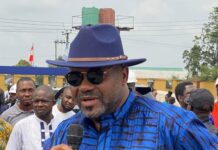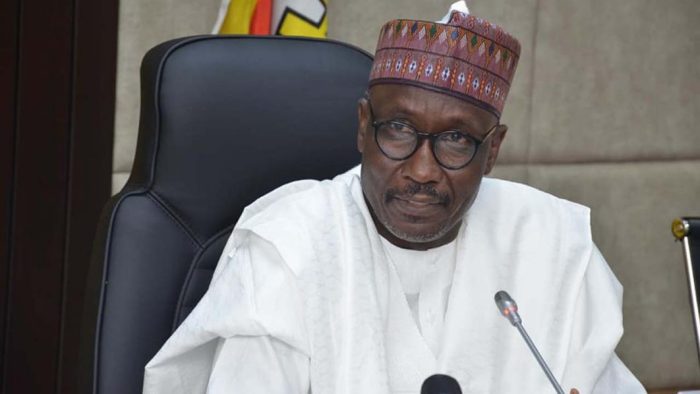By Yakubu Aliyu/Government House, Benin City
Since General Muhammadu Buhari forayed into politics in 2003, one issue that has become a recurring decimal during electioneering campaigns and practically has refused to go away was the alleged “cancellation” of the Lagos State rail mass transit project (the metro-line project) by the military regime he headed in 1984/85. Over the last one month, with the onset of another electoral cycle, the news media and political actors opposed to his aspiration have resurrected the issue once the General emerged as the flag bearer of All Progressives Congress (APC) to contest the 2015 election.
The story line has also remained the same. It is alleged that Gen. Buhari singlehanded caused the project to be cancelled despite its developmental potential and that the action was motivated by his political and ethnic bias against a section of the country, in this case the South-West geo-political zone. It is also argued that by shelving the project, Gen. Buhari had contributed towards compounding the hardships presently faced by Lagos residents arising from persistent and chaotic city-wide traffic situation, which the metro-line was intended to resolve. No less a personality than a serving Minister of the Jonathan government and a daughter of Chief Richard Akinjide, a key player during the Shagari regime, had clutched to the hyperbole that Gen. Buhari should be held responsible for the challenging traffic situation being faced by residents of Lagos.
Under normal circumstances, one could have excused these assertions as products of soap box politicking or mere muckraking and allowed politicians to get away with it. But there was more to the stoppage of the Lagos metro-line than the simplistic analyses we have been fed with so far.
A review of the political and economic forces at play at the time Gen. Buhari came to office would enable us to put the issues in a proper context. First, let us briefly look at the background to the project.
The project was conceived by Alhaji Lateef Jakande, the Action Governor of Lagos State (1979-1983). The objective was to ameliorate the traffic congestion in Lagos city and provide cheaper alternative to urban transportation that would benefit the ordinary people. This was in line with the welfarist ideology of his party, the defunct Unity Party of Nigeria (UPN), under the leadership of the late Sage, Chief Obafemi Awolowo, which also had free education, free health care and full employment, as its cardinal programmes.
The cost of the project was to be within the region of N700 million, while the financing was through a commercial loan from a consortium of private firms and contractors. The Lagos State was to put down 10% of the costs, as mobilization for the contractors. Incidentally, the duration of contract execution was put at two years which also was expected to match with the loan repayment.
Instructively, before the project could take off, there was a lingering issue related to issuance of guarantee by the Federal Government. Recall that it has been a standing practice in Nigeria’s debt management policy that external borrowings of the State Governments must be guaranteed by the Federal Government. Moreover, during this period, the Federal Government managed the entire debt for the whole country, including debt repayment through the Central bank of Nigeria (CBN).
As narrated by Alhaji Jakande, the main actor in the whole saga, it was not only that the guarantee was not forthcoming but that even the initial N70 million required to mobilize contractors was effectively denied by the CBN.
According to Alhaji Jakande: “I was told President Shagari was angry because I did not congratulate him after his controversial election [in 1983] and because I won election on the platform of an opposition party [UPN]. I later approached him and explained the problem facing execution of the project and that CBN refused N70 million reserved for its take-off.
“President Shagari said it was because there was fuel crisis. He said the CBN governor would visit him that evening and that he would get back to me after talking to him on the metro-line project fund. I quickly replied that I would wait for him since I considered him paramount to undo the knots on the release of the fund.”
“The CBN governor finally arrived, and President Shagari raised the issue of N70 million metro-line project fund. But the CBN governor said the fund cannot be released at once. He asked me to withdraw as many times as possible citing the reasons of bad economy and increasing fuel crisis at the period.”(http://allafrica.com/stories/200907230352.html?maneref=http%3A%2F%2Fwww.google.com%2Fm%3Fq%3DLagos%2BMetro%2Bline%2BJakande&mstac=0)
What could be deduced from Alhaji Jakande’s account is straight forward: by the time the Buhari regime came on board in 1983/84, the Lagos metro-line project was effectively sabotaged by the Shagari government, first by withholding guarantees and secondly by delaying the release of the funds required to mobilize contractors.
The Buhari regime met a chaotic economic situation and a monumental/unmanageable debt crisis. Worst, between 1980 and 1982, oil export receipts declined by about 50%, from US$24.9 billion to US$11.9 billion. In response, the Shagari government embarked on massive external borrowings from the international capital market (ICM). These borrowings were typically short and, therefore, highly problematic for long-term, infrastructure project. As a consequence, Nigeria’s debt sharply rose from $11.99 billion in 1982 to $17.57 billion in 1983, according to the World Bank.
Federal and State governments were groaning under heavy debt burden. They could not pay workers salaries, in many cases for up to 12 months.
Essential commodities were scarce, as importers could no longer import because of loss of confidence in Nigeria’s Letter of Credit (LOCs) by foreign suppliers. The international financial community had demanded repayments of debt as a condition for any constructive engagement on broader economic policies that would give the country some breather.
We must not forget that during this period London Inter-Bank Offered Rate (LIBOR) which is the benchmark interest rate for commercial loans had begun to rise from as low as 3%-4% in the early 1980s to about 8% in 1985 and peaking at 13% by 1989. The cumulative impact of these developments in global interest rates was to raise the amount of the debt without any correspondent transfer of real assets. Furthermore, the shortened loan maturities and reduced grace periods of these loans led to a bunching up of debt service payments, as interest rates began to rise.
This partly also explained why successive governments could not proceed with the metro-line project under the prevailing financing arrangements and costs of funds, because not only was it too expensive for the government to continue to shoulder, the debt burden was becoming unsustainable. This implies that any addition to the debt of such nature would be doubly injurious to the economy, particularly as oil prices continued to plummet.
With the benefit of hindsight, it could be said that the rising repayment costs was partly responsible for the failure of several projects financed with similar loans, and worst the ballooning of Nigeria’s debts without a corresponding welfare value. A study conducted in 1996 showed the following with respect to those loans taken in the 1980s. (a) about 65% of the projects, accounting for about 76% of the funds loaned to the various governments (states and federal) had failed totally; (b) only 1 out of 63 projects, accounting for 2% of the total loan value, had repaid its original investment and was still functioning effectively; (c) a quarter of the projects were reasonably functional, although they continued to face operational problems relating to the lack of working capital, foreign spare parts, and competition from cheap imports; (d) six projects, ranging in value from $6 million to $70 million appeared to be fraudulent; and (e) three of these projects only existed on paper while two others had little or no sign to indicate that any value was delivered at all. (See Iweala, N. O, Soludo, C. C. and Muhtar, M. *The Debt Trap in Nigeria*:* Towards a Sustainable Debt Strategy*, Africa World Press, 2002).
From the foregoing, it could be deduced that the Lagos metro-line project might have suffered the same fate because the economic realities could not have supported it continuation given the prevailing economic realities and onerous contract terms.
It is evident from the foregoing that General Buhari acted responsibly in respect of stopping all loan contracts that were haphazardly entered into, and focusing on debt repayments to regain the confidence of the international community. As a consequence, the Lagos metro-line project was caught in the cross fire of political intolerance exhibited by the Shagari NPN government against an opposition party ran Lagos State on the one hand,and the economic emergency and crisis management which the Buhari regime had to contend with, on the other hand . It would amount to economic recklessness on the part of the Federal Government to give Federal Government guarantees to such a loan contracts, even under current conditions where the economic situation is relatively favourable. In the midst of economic and financial chaos, it was sound economics to put a stop to that project, so as not to imperil the future of Lagos State and the wider economy that was struggling to get out of debt peonage.



